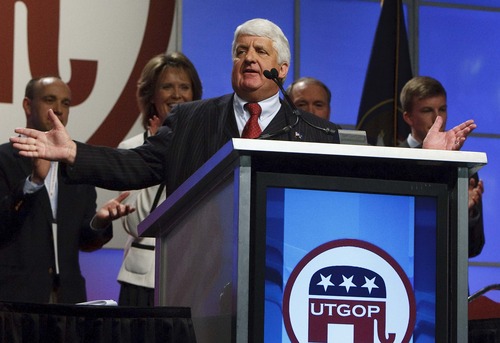This is an archived article that was published on sltrib.com in 2013, and information in the article may be outdated. It is provided only for personal research purposes and may not be reprinted.
Washington • Members of Congress must shop for private health insurance through the Affordable Care Act, but a loophole allows them to continue to offer government coverage to their employees.
And Rep. Rob Bishop, R-Utah, is going to let his staff take advantage of that if they so choose.
"I'm not going to force this disastrous scheme on anyone, including my staff. People deserve choices and options," Bishop said Wednesday. "I won't be getting myself out of this mess but I'll sure as hell keep as many out of it as I can."
Bishop will let his employees decide if they keep their insurance through the Federal Employee Health Benefits Program, which covers the vast majority of federal employees, or shop for private coverage on the District of Columbia's Health Link exchange.
Under Obamacare, most congressional staffers were expected to shop for private coverage, but a new guidance, obtained by The Salt Lake Tribune, says each member can decide who is an official staffer and who isn't. Those deemed "unofficial" can stay on the government plan.
No other member of Congress from Utah is taking advantage of the guidance, though Sen. Orrin Hatch's office said it wouldn't talk about personnel issues.
"I feel that I have no choice but to comply with the letter and the spirit of the law by enrolling myself and my staff in Obamacare," said Rep. Jason Chaffetz, R-Utah, adding later, "as much as I hate it, it is the law."
Sen. Mike Lee, R-Utah, is taking the same tactic, while Rep. Jim Matheson, D-Utah, said he's following the standard set up by chief administrative officer of the House.
If a member declines to make a decision, then the House administrator will require those paid by the member's office budget to shop on the exchange.
Staffers paid through other sources, like congressional committee budgets, can keep their government insurance. All of Matheson's employees are paid exclusively from his office budget while Lee has a handful of employees tied to the Senate Judiciary Committee who will stay on the federal plan.
Hatch oversees his personal aides as well as a group assigned to the Senate Finance Committee, where he is the top Republican. Hatch's spokesman said the office won't comment on any personnel matters or the regulations pertaining to congressional staff.
Rep. Chris Stewart, a freshman Republican, hasn't made a decision yet on his staff. He has until the end of business on Thursday. Open enrollment for members of Congress and their staff members begins in mid-November.
Affordable Care Act">loophole. Rep. Darrell Issa, R-Calif., has decided that all of his employees are "unofficial," telling Politico: "I've gotta make the right decision for my employees."
The insurance offered to members of Congress has been a flash point in the health debate for years. Sen. Chuck Grassley, R-Iowa, authored the amendment to the Affordable Care Act requiring congressional employees to get coverage through the exchanges, which were designed for those not insured through their employer.
That raised the question of whether the government would continue to subsidize the coverage of congressional employees or would they have to pay the full price of their plan. President Barack Obama's administration decided the subsidies were legal, though some Republicans, like Sen. David Vitter, R-La., have fought to remove them.
None of Utah's six members of Congress supports the health law.
Twitter: @mattcanham
Thomas Burr contributed to this article.



